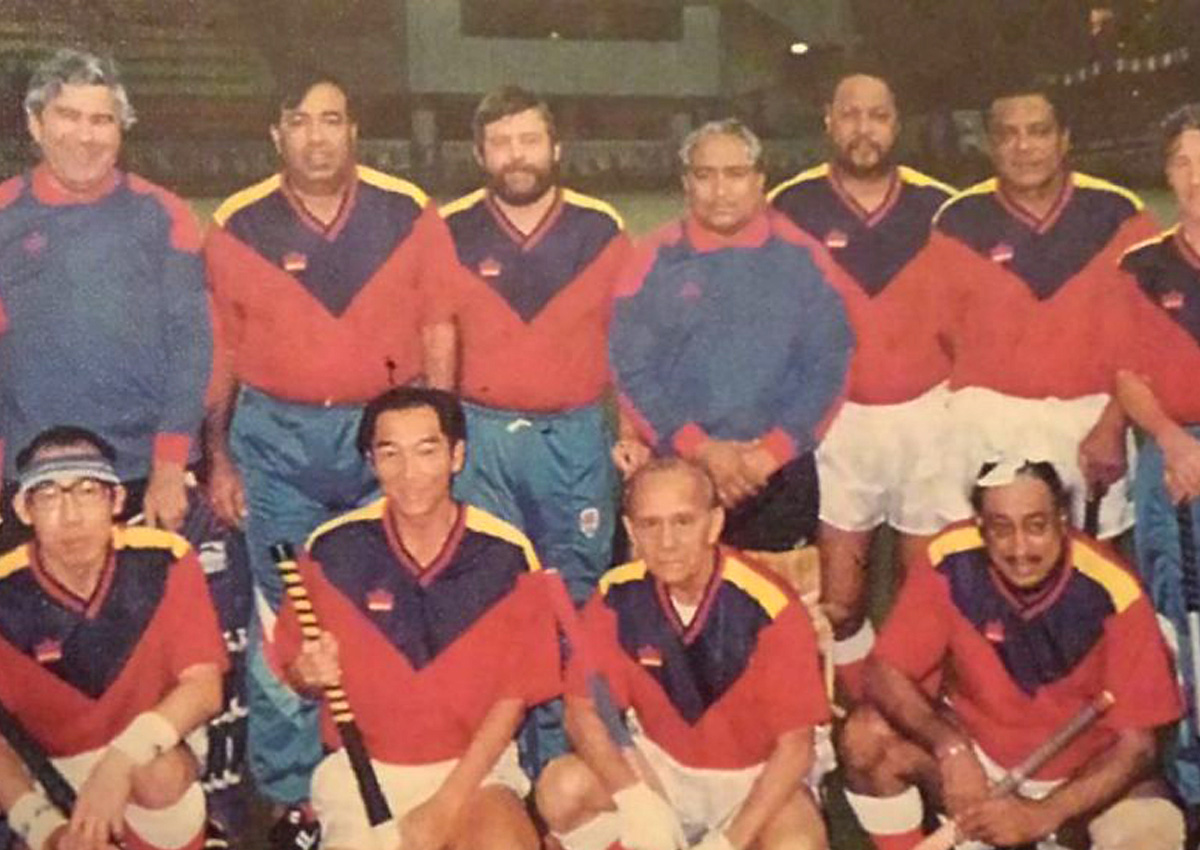In his heyday, there was hardly anyone who could match him on the hockey field. Kerala-born Burdett Matthew Coutts was Singapore’s oldest and best hockey striker at the 1956 Melbourne Olympics. And he was 37 years old then.
In the eyes of his contemporaries, the Anglo-Indian was “the very best striker to play in Singapore”.
The Singapore Olympians book, commissioned by the Singapore National Olympic Council (SNOC), commended his “dazzling display of skills” during the only time Singapore took part in the Olympics 60 years ago, and Coutts was nicknamed “The Magician” for his “truly skilful attacking play”.
He died on March 17 in Clacton-on-Sea, a seaside resort town in Essex, England, where he had migrated to in 1965. Fulfilling his wish, on April 22, he was buried beside his wife in New Malden, a suburb in south-west London.
“We couldn’t get a closer burial day in New Malden, which is a four-hour road drive from Clacton-on-Sea, and had to wait close to four weeks to do the final rites,” his son, Ashley, who now lives in Germany, told tabla!
Speak to any hockey stalwart in Singapore from the ’50s and ’60s and they will instantly hail Coutts as the modern-day hockey version of Diego Maradona. He single-handedly electrified the sport in Singapore with his Indian style of hockey.
His oldest granddaughter Tracy, who delivered the eulogy, traced the roots of her grandfather. He was born in Cochin, Kerala, on Sept 19, 1919.
She said: “Grandpa was the youngest of 10 children and had to survive on scraps, which may well have accounted for his small size. When he moved to England in 1965, most of his clothes were in fact bought from the boys’ department of Harrods.”
Academically brilliant She recounted how he boarded at St Patrick’s High School, Madras, when he was eight. At 16, he was ranked No. 1 out of 108 in his final school-leaving examination. But, despite his excellent academic grades, he was also branded a rebel of sorts.
He reportedly sneaked out of school to watch the first “talking” movie. He was caught and the punishment was a fully-shaved head!
At St Patrick’s, he was outstanding in hockey as a striker and a track champion in athletics. After school, he worked as a clerk for Burma Shell from 1936 until 1943, when he was accepted into the Army Royal Ordnance Corps, Bombay. As a Warrant Officer he was sent to the Burma front and then to Singapore, where his regiment gathered after the Japanese Surrender in 1945.
In Singapore, the granddaughter added, the hockey star met his wife Doris, marrying her in 1946. He was then 27. He worked as an accounts clerk and auditor for Michelin Tyres. He later became the sales administration manager before applying to relocate to England in 1965. Doris died in 1998, leaving Coutts a very broken man, according to family members.
Retired teacher Tony D’Cruz, a Malayalee, said Coutts reckoned that he had “mastered the finer points of the stick-and-ball sport, having been exposed to the toughest challenges in India”. After the war, he played for the Domiciled Europeans and Anglo-Indians Sports Club in Bombay.
In Singapore, he immediately looked for the chance to play top-flight hockey. But on arrival here, he was critical of the standard of the sport. His own assessment of the top individual players was almost restricted to the names of Ronnie Barth, Chai Hon Yam and Edwin Doraisamy.
Best striker Coutts was considered by Gian Singh, the Malaysian coach, to be the best forward for Singapore in 1955 but age was not on his side. However, Coutts put to rest the fear of officials who might have suggested that he was too old for the Olympic Games, with a dazzling display for the Singapore Civilians against the Joint Services in the annual Poppy Day match in November 1955.
He was 37 when Singapore was invited among 12 countries to play in the Melbourne Olympics. But he was determined to have a shot at the world’s highest peak of amateur hockey. Sadly, with his gung-ho style of attacking play, running for every ball, he became susceptible to injury.
The Straits Times reported that rather tragically for Coutts and the team, he seriously injured his knee during the third match at the Olympics – against India, his motherland which he never dreamt he would play against on the international stage. For the record, India won the hockey gold medal for the sixth successive Games, not conceding a single goal in the entire tournament.
Coutts was the key player of the Singapore team and was sorely missed for the rest of the tournament. Different attacking combinations could not compensate for the loss of the “magician” at inside right.
Tracy said that after the Olympics her grandfather was seen quite regularly as an umpire. But, off and on, he was very competitive and delighted in showing younger players that he had retained his speed and skill, even after the age of 40.
Between 1960 and 1965, he coached the Singapore national team, which played at the Asian Games in Jakarta in 1962, before he left to join his family in England. Singapore finished fifth out of nine countries at the Jakarta Asiad.
Last hockey match at 82 In her elaborate eulogy, Tracy said that in England, Coutts played for Raynes Park Hockey Club, winning the Truman South League with them in 1972, at 53. In his 70s, he even played in the Pacific Rim Masters Tournaments for the Singapore Hockey Veterans (over 50s) between 1991 and 1996, in Hong Kong, Singapore, Canada, New Zealand and Australia.
His last hockey match was on Sept 23, 2001, in Leverkusen, Germany, two days after his 82nd birthday, where he played with his son Ashley and youngest grandson Dustin.
“We remember him for being a family man and a hockey ace, but also for being the life and soul of the party. Some might say the original party animal!
“He truly loved his singing and the songs and singers of his era – the likes of the Rat Pack, Glenn Miller, Harry Belafonte and Elvis among others and Tina Turner, Kylie and Lady Gaga in more recent years. He loved the ladies and, given any opportunity, enjoyed dancing with them, jiving (rock and roll), rumba and samba,” said Tracy.
She added that in his final years, closer to the 90 mark, he “might have had a reduced appetite for food, he certainly made up for it with a healthy appetite for beer and the odd whisky (or three)!”

Get a copy of tabla! for more stories.






